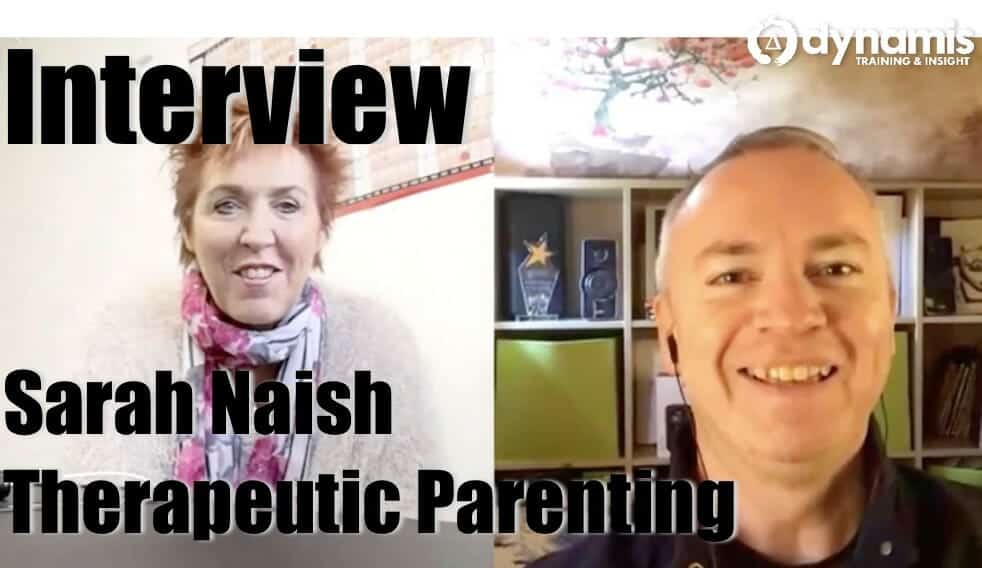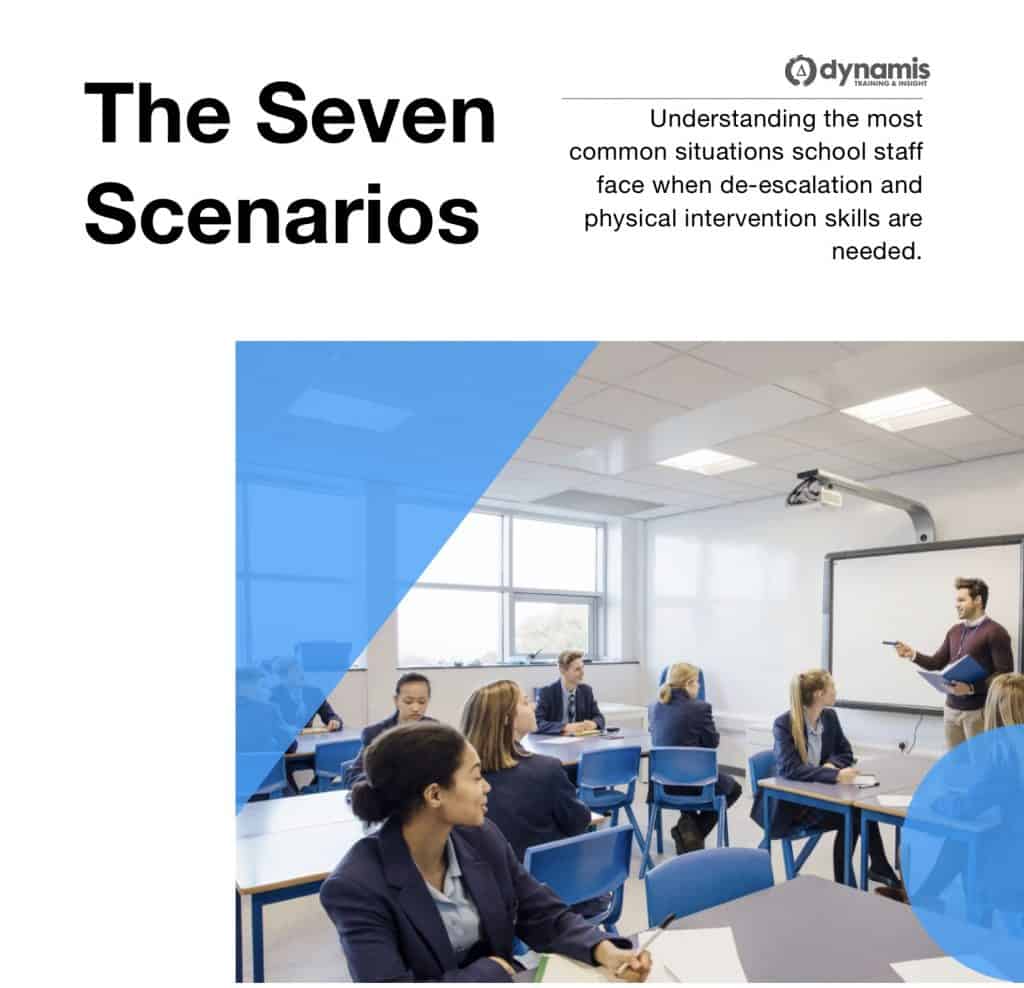Interview with Sarah Naish – Therapeutic Parenting Expert
“if I had not had the correct training myself, I don’t know how I would’ve got my children safely to adulthood with our relationship intact.”
Today I want to introduce you to Sarah Naish, and let you in on some excerpts from a conversation that I had with her recently. Sarah is an author and an expert on therapeutic parenting. We’ve been working together for a while on developing and delivering a training course which teaches strategies for parents who are at home and have to deal with managing violent behaviour from their children.
To skip forward to watch the whole interview recording now, simply click here and register: http://www.dynamis.training/mvb1/
Sarah Naish is the author of training and published works which are really useful for both parents and children to understand the very powerful feelings that can emerge when a child has a traumatic background. These children can then present with behaviours, including violence, that are very difficult for adults and parents to understand and deal with.
Sarah is the author of numerous books including The A-Z of Therapeutic Parenting: Strategies and Solutions. This is a fantastic resource in a great format, which should help anybody dealing with these kinds of behaviours to go and get strategies really easily and quickly, and be able to find some tactics that are helpful. People are finding this such a great resource, and that’s one of the reasons I wanted you to meet Sarah in this conversation today.
I know that lots of foster carers in particular – and also adopters in some cases – around the country are struggling with this issue. The “last taboo” of child to parent violence in the home context. We developed a jointly-delivered course with Sarah and her team on managing violent behaviour and have done many of those now at this point around the country and we’re getting really good feedback and results from them.
Sarah and her training team do a lot of work in Schools:
“It has become increasingly needed. I would say over 50% of the inquiries we get are around school issues, particularly, parents who are trying to manage schools. Teaching Staff are really struggling to manage the children’s behaviour in schools. A lot of them don’t know about therapeutic parenting techniques, and some are attachment-aware and some aren’t. On top of that, we see issues arising because there’s a big conflict between what the schools are doing, and what therapeutic parents are doing at home. We use therapeutic parenting techniques (TP). We know that it’s very, very effective, and parents are feeling much more empowered using the techniques within TP. But of course if the children are then going off to school, and having a completely different set of boundaries, a completely different set of behaviour management techniques, really, then it can’t work.”
COUNTER-INTUITIVE STRATEGIES
One of the first things I really learned from the interactions between my team at Dynamis and Sarah’s team at the National Association of Therapeutic Parents is that the methods that teachers would normally use to manage behaviour in a classroom would actually be counterproductive for a child who’s got significant trauma or attachment issues.
Sarah again:
“For example we know that children with background of developmental trauma, have invariably high cortisol levels, which is often misinterpreted as ADHD. So for example, a child might be in a classroom working, or trying to work, trying to concentrate, and something might happen and it could be something really small, like a loud bang or somebody walking past the classroom. The child, because they’ve got high cortisol levels already, has an immediate spike and the child goes into fight, flight, freeze, defensive rage. So that child might feel compelled to rush out the door – this is something that we hear a lot. And they’re going push anything out of the way in order to get out the door. So that’s often misinterpreted by the school as the child being aggressive or violent because they’re pushing people out the way to get out the door, and often the child has no memory of that.”
FLIGHT STRATEGIES
At Dynamis we know that every school in England has what they refer to as the “runners – children who try to leave the classroom or the school building. Our advice to them often is to get better fences! When a child really wants to leave the classroom, the way we would interpret that is that they’re in a panic state, and they’re in full “flight”. Something in that classroom has really set them off, has really triggered them and escalated their state. The last thing you want to do is keep that child in that space if opening a door to the classroom is a safe option for you. The main concern has to be that the child can’t get off the school premises, and thereby, in a tizzy, run in front of a car, for example. We would normally advise teachers to allow that child to escape the classroom if they really needed to.
Sarah:
“A lot of the violence comes about when the child can’t exit the classroom. What we cover on our joint-delivery training courses with Dynamis is around the idea that, well there are particular ways in which this child is interpreting the world at this moment, this is how they’re feeling. And once you get that, the strategies which teaching staff can use to influence their behaviour come a lot easier”
Seeing things from the child’s perspective is so critical – seeking to understand their perspective is such an important first step for the teachers and the staff.
UNDERSTANDING THE PHYSIOLOGY OF TRAUMA
Sarah:
“What we’re finding is that because a child with previous trauma has cortisol levels which are higher at school anyway than they are at home, often the behaviours that we see in the home environment are magnified at school. We want to get much more joined-up working between parents and teachers so that everyone’s on the same page and to improve everyone’s understanding. Because if you’re using therapeutic parenting techniques or therapeutic teaching, and you’re on the same page, the child is going to feel a lot safer and be more contained, so a lot of the parents for, example, that have been on our Managing Violent Behaviour courses, have found that since doing the course, they don’t need to use any of the physical management strategies for the critical-level violence, because now they are feeling safer and more confident and that ‘presence’ is being communicated to the child, that the parent or carer is more confident – they’re not scared of the child. It’s very important. As the parent or carer presents this more confident and informed presence, the incidents of extreme violence dramatically reduce.”
The really positive thing about engaging in physical protective interventions skills work with these parents has been that they increase in confidence that they can manage crisis events, and we know from anecdotal evidence that they will persevere longer in the moment when they are employing therapeutic parenting strategies. So many times I’ve sat in the room with the Therapeutic Parenting trainers, and the parents are talking about how afraid they are – they are afraid of all kinds of things. They’re afraid of what the professionals are going to say, they’re afraid of what might happen in school, when the child talks about what happened at home. They’re afraid of their own reactions. There’s a lot of talk about fear.
A feature of our work at Dynamis for years is that we teach people physical strategies and how to manage incidents when they reach that ‘out of control’ moment. Many, many courses that people attend teach deescalation strategies and verbal communication strategies. Those concepts and skills are hugely important, but often they stop at that ‘out-of-control’ moment and they effectively say “well, if the incident becomes violent after this point, then, well the best of luck. Or ‘do your best’. Or even worse, as we know, the carers or parents are told that they are not allowed to protect themselves, or they’re not allowed to touch the child.
This legally inaccurate advice creates anxieties and fear, feelings which then impact on how well the carers perform during the communication phase of these incidents.
Sarah:
“one of the main things that came up time after time after time was that the carer or parent would say: ‘our agency says we’re not allowed to touch the child’ ”
For me as a personal safety coach and physical intervention expert witness and advisor, it has been so interesting to talk to the parents about that moment – where they are feeling challenged about how they are still committed to being therapeutic in their approach and yet they have a moment where they are feeling physically threatened by the child, yet they are still trying to be therapeutic. And there’s a balance about feeling protected in yourself, so that you can then be effective in employing therapeutic approaches.
We’ve had parents say to us that the children themselves, if they do have a very out-of-control moment when they become violent that it really impacts on their feelings of shame and hurt afterwards. So in a way, allowing the child to be violent is compounding some of the causes associated with their behaviour. Perhaps stopping their violent behaviour sooner – and in a smart and intelligent way – can really help with modelling different behaviours and helping the child to deal with those feelings.
Sarah:
“The reason that we devised this two day course, which actually has taken many years of our joint experience to come up with, is because this is what people need. And I know having been in that situation, working with a lot of parents who feel so disempowered and so desperate – and I’m sure teachers are feeling that way as well. It is two days out of the parent or carer’s life, but it does change everything. It changes the dynamic, which is really important. I know, as an adopter, that if I had not had the correct training myself, I don’t know how I would’ve got my children safely to adulthood with our relationship intact. So it’s that fundamental. As a therapeutic parent, you are the unassailable safe base. If the child’s kicking and punching you, you are not unassailable, you are unsafe. And if you’re an unsafe parent, the children will feel unsafe. So there’s no shortcut to that I’m afraid.”
I recently had a Facebook Live conversation with Sarah Naish to talk about our work together and how schools can better interface with and learn about trauma, adverse childhood experiences and therapeutic parenting.
To get access and watch the whole interview recording, please visit the following webpage and register your details.[ http://www.dynamis.training/mvb1/ ]
We throughly recommend that you consider joining the following Facebook Group:
Visit: https://www.facebook.com/groups/therapeuticparents/
We are working with the National Association of Therapeutic Parents to deliver ‘open’ courses in Violence Management at Home.
Visit: https://www.naotp.com/





